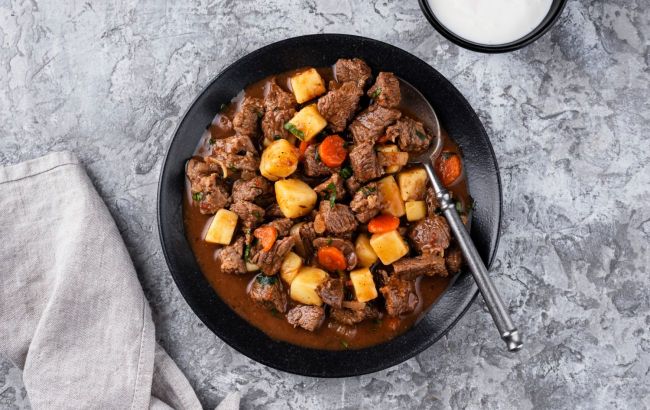How long to stew meat to make it soft and juicy: Tips from chefs and housewives
 How long to stew meat (illustrative photo: Freepik)
How long to stew meat (illustrative photo: Freepik)
Stew is one of the most delicious and popular dishes in many cuisines around the world. But it's not always easy to achieve the perfect texture - cooking time is one of the key factors.
How long to stew meat
The first thing to consider is the type of meat. The stewing time depends greatly on the type of meat you use, because different types have their own cooking characteristics.
- Beef. Tough parts of beef, such as the shoulder blade, neck, brisket or leg, need a long braising to become soft and juicy. As a rule, it takes from 1.5 to 2.5 hours at an average temperature.
- Veal Depending on the toughness of the meat and the cooking temperature, veal is stewed for 1.5 to 2.5 hours.
- Pork. Simmering for 1 to 1.5 hours is sufficient for pork. If you are cooking tender parts, such as tenderloin, this time can be even less.
- Lamb. Braising lamb takes about the same amount of time as beef. For example, a lamb shoulder is braised for 1.5 hours, while other parts of lamb can be braised for up to 5 hours.
- Chicken. Chicken cooks faster than all other types of meat. Braising can take from 40 minutes to an hour, depending on which part you use.
The stewing time also depends on the heat at which the meat is stewed. However, for most types of meat, it is recommended to use medium or low heat to ensure that the meat is heated evenly and does not dry out.
How to properly stew meat
To make stewed meat soft and juicy, it is important to follow a few cooking rules:
- Marinate the meat before stewing. The marinade softens the meat fibers and makes the dish more flavorful. It is recommended to marinate poultry for 30-40 minutes, and beef and pork for 2 hours.
- Pre-fry the meat. Before you start stewing, fry the meat in a frying pan on all sides until golden brown. This will help keep the juice inside the meat, making it more juicy.
- Select the temperature mode. Simmer the meat over low to medium heat so that it warms up evenly and does not lose moisture.
- Cover the dish with a lid. Simmer the meat covered to retain moisture. This is especially important if you are cooking tougher cuts of meat like beef or pork.
- Add spices and vegetables. Vegetables (carrots, onions, potatoes, celery) not only improve the flavor of the dish but also add moisture, which helps tenderize the meat. Spices such as thyme, bay leaf, or garlic also help to balance the flavor. However, small vegetables that cook quickly (broccoli, peas, or green beans) are best added 20 minutes before the meat is ready.
- Control the amount of liquid. Stewed meat must retain moisture, otherwise it will be tough and dry. If the water boils significantly, add a little boiled water to the meat.
The easiest way to tell if the meat is done is to cut it or try to separate the pieces with a fork.
The meat should be soft and easily separated from the bones or divided into small pieces. At the same time, the pieces should retain their original shape.
Sources: Yevhen Klopotenko's culinary website, Serious Eats, Food Network, Allrecipes, Taste of Home.

